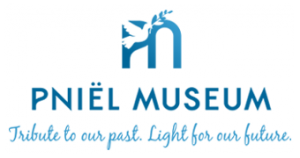Establishing of a Museum in Pniël
Over the past few years the church has put in tremendous effort to make people aware of this unique heritage by erecting a few monuments on the historic Werf area. Monuments like the Slave Memorial erected in 1993, to commemorate the emancipation of slaves in 1838, the Slave Bell, and the Ubuntu Monument, that was commissioned by the National Heritage Council and unveiled by Dr Kenneth Kaunda, tells of this rich history. A monument in the shape of a tree trunk was also erected in memory of an old oak tree, die Klokboom (Bell tree), on the spot where the slave bell hung in an old oak tree.
- Slave Memorial
- Slave Bell
- Ubuntu Monument
The search for our roots and especially the context from which our village and inhabitants originated and grew, necessitated a more sustainable structure. The Church thus initiated the establishment of the Pniël Heritage and Cultural Trust (Pniël Erfenis- en Kultuurtrust, PEKT) in 2006.
The following logical step then was the establishment of a heritage site of which a museum was to be the focus. The establishment of a museum in Pniël is a long awaited dream and an ideal that has been nurtured over a very long time. Because of this, plans to sustain such an undertaking also developed over time. The last hurdle was the lack of an appropriate venue. The church had a new parsonage (manse) built into which the resident Reverend and his family moved in 2010.
The old Manse, the former homestead of Papiere Molen, the farm on which Pniël was founded, was the ideal venue to house the planned Museum. The original building was built in the 1700s and was used as residence to the local ministers from 1843 – 2010. The fact that the building will now be used as a museum will thus also ensure that the building will be better protected in its historic surroundings.
The Trustees were very fortunate to have obtained the services of the renowned Prof. Matilda Burden, Senior Curator and Researcher, Cultural Heritage at the University of Stellenbosch. With her dedication, hard work and support the Pniël Museum was officially opened on the 18th of May 2013, which is some 175 years after the abolition of slavery in 1838. The Museum was opened by Rev. Thulani Ndlasi, Secretary of the Synod of South Africa and the Reverend Leon Klate, resident Reverend of the Pniël Congregational church and Moderator of the Peninsula Regional Council.
The building is perfectly situated on the R310. The majestic old garden, with remnants dating back to the days of Rev. Stegmann (1843 – 1910), serves perfectly as a venue for a Tea Garden and Kiosk (opened December 2012) where visitors are able to enjoy the many delicacies of the village people and buy crafts made by the people of the valley.
Our vision is that one of the many benefits that will flow from the establishment of the museum, Tea Garden and Kiosk will be employment. This will include local tour guides that will take people to the nearby Werf with its monuments, up to the historic Congregational church and of course a leisurely walk down Middle Street with some of the very old houses still intact. Hikes to the Simonsberg Mountain can also be arranged.
Most of all, the museum is a dream come true for a community that is trying to get in touch with its past and to appreciate the individual freedom and human rights that our Constitution and our democratic dispensation offer, and hopefully, to regain the spirit and embrace a forgotten history.





